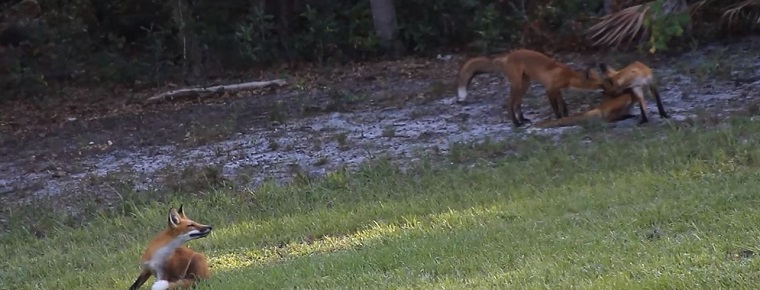-
info@aaanimalcontrol.com
Call us for help in your town
Humane Wildlife Education
Should I ever poison a fox? (the answer should be NO)
Need fox removal in your hometown? We service over 500 USA locations! Click here to hire us in your town and check prices - updated for year 2020.
In theory, using poison to rid your home or land of a nuisance wildlife problem makes sense. You don't need to get too close to the problem, and it's pretty quick death which means it’s humane, or so it says on the packaging. It’s also cheap and simple. You open the poison packets or sachets, place them in whatever plate or dish you have decided to use (or the one provided), and then just clean up the mess a little while later, should you find it. You’re hoping the fox eats the poison, heads back to its nest, and then dies comfortably and without pain in its sleep, of course.
Sadly, when you use poison, that's not how it all goes down. Quite the opposite, in fact.

There is no registered poison for you to buy with the intention of poisoning foxes. There’s a good reason for this. Nothing works. You would need to use poison sold for other animals, such as rats and mice, or you would need to come up with your own concoction of ingredients. There are plenty of recipes of homemade fox poison on the internet, but they are all incredibly dangerous, for you, your community, the pets and kids within that community, and other animals. In many cases, the fox won't even go anywhere near the poison you have put down for them.
You could accidentally poison another animal — a cat or dog in the neighborhood, for example, or a rabbit that managed to escape its hutch down the street. You might poison another wild animal, such as a raccoon, rat, opossum, coyote, etc. If you poison an animal that is protected, either at a federal or state level, you could find yourself in a lot of trouble. There are more laws than you’d think surrounding the subject of killing and poisoning nuisance wildlife.
Depending on the poison(s)/substances you’re using, you could actually cause long-term damage. If the poison gets into soil or water sources, you could poison entire communities. Again, if you’re making up your own recipe, or using the poison that has been intended to be used to kill a small animal, you’re probably going to use the wrong amounts of everything. Unless you’ve got a keen interest in chemistry, this probably isn't the best idea. And biology too, for that matter.
The thing that homeowners often overlook when you looking at poisoning nuisance wildlife is that it’s incredibly inhumane. There is no poison for any animal that works anywhere near as quickly as it promises on the packet. What normally happens is that the poison does serious internal damage, usually over a prolonged period of time. The fox might not even die, at least not straight away, but it will be vulnerable, and therefore, more likely to fall prey to predatory attacks. It won't have been the poison that kills the creature. That will have just made it very sick, causing internal bleeding and other things that kills it in a very slow and cruel way.
Alongside the inhumane factor, poison also leaves the potential for secondary poisoning, and that can happen when other animals eat the flesh of the poisoned carcass. When you put poison down for rats and mice and that poison then kills the rodents, other animals, such as cats and dogs, can eat and play with the carcasses of the dead rodent. If there is enough poison still found in the rodent’s system, that poison can pass on to the cat or dog now eating or playing with it. In the worst of cases, secondary poisoning can kill.
There are too many bad things to say about poison, aside from the fact that there isn't a poison for foxes, and it rarely works for the animals it HAS been designed for. You will be wasting your money if you pursue this as a method of fox removal, and you may even find yourself in hot water with the law because of it.
Read aboutHow to get rid of fox
For more information, you may want to click on one of these guides that I wrote:
How To Guide: Who should I hire? - What questions to ask, to look for, who NOT to hire.
How To Guide: do it yourself! - Advice on saving money by doing wildlife removal yourself.
Guide: How much does wildlife removal cost? - Analysis of wildlife control prices.
Animals in the attic - read about the common species.
Noises in the attic - how to identify critters by their sounds.


















